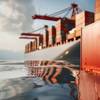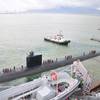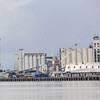A news conference will be held on February 5, responding to President Bush’s FY’08 budget request and how it could adversely affect U.S. seaport security, trade and waterside access to U.S. public ports.
Discussing these issues will be Kurt Nagle, president/CEO of the American Association of Port Authorities, and Warren McCrimmon, who is the seaport director for the Toledo-Lucas County (Ohio) Port Authority and AAPA’s 2007 U.S. Delegation chairman.
The meeting will be held at the National Press Club in Washington, D.C.
According to the AAPA, funding to protect U.S. seaport facilities in the Administration’s proposed FY’08 budget, to be released on Feb. 5, is expected to be below what public ports need to defend their facilities against terrorism, and far below what Congress authorized spending for port security in the SAFE Port Act of 2006. One result of insufficient federal appropriations is that seaports must often postpone needed security investments, or shift funds away from other important projects to pay to protect against increasingly sophisticated criminal and terrorist threats.
Similarly, the Administration’s proposed FY’08 budget is expected to be well short of what is needed for the U.S. Army Corps of Engineers to maintain federal navigation harbors and channels at their authorized depths. Ample money specifically to pay for this dredging work is collected on imports and domestic shipments and placed into the federal Harbor Maintenance Trust Fund. Yet, each year, the Administration requests and Congress appropriates millions of dollars less than what is actually collected, and needed, to keep waterways dredged to their authorized levels. This has swollen an already bloated Harbor Maintenance Trust Fund surplus (now at about $3.5 billion!) while the nation’s waterways increasingly suffer the effects of inattention. Each year that federal navigation maintenance projects are postponed or under-funded due to insufficient appropriations, it puts our nation at a competitive disadvantage to export its products overseas and causes the cost of waterborne imports to go up.
Featured videos

Unlock Onboard Data Efficiencies

Inmarsat Enhances Service to Drive Digitalization

Tracking Foreign Vessels Working in the U.S. Jones Act Market
Subscribe for
Maritime Reporter E-News
Maritime Reporter E-News is the maritime industry's largest circulation and most authoritative ENews Service, delivered to your Email five times per week









